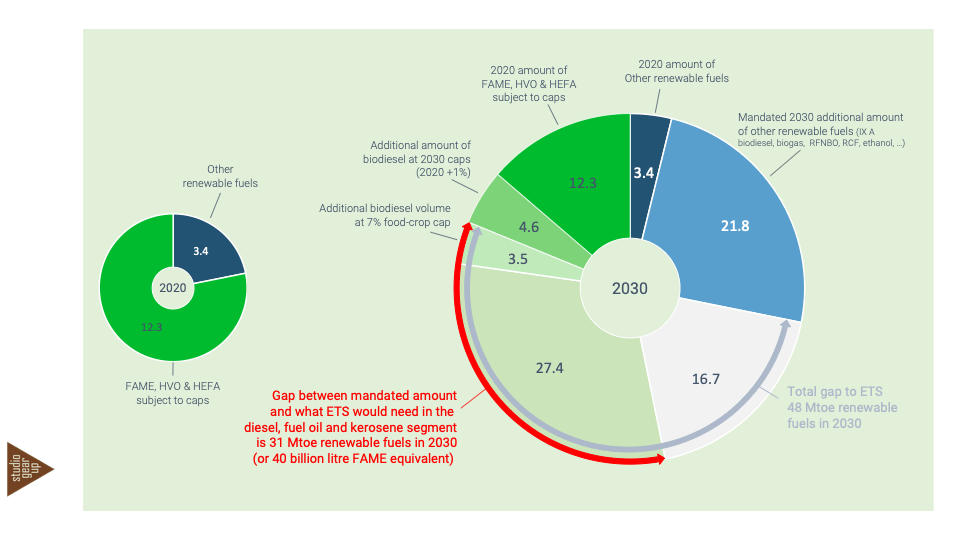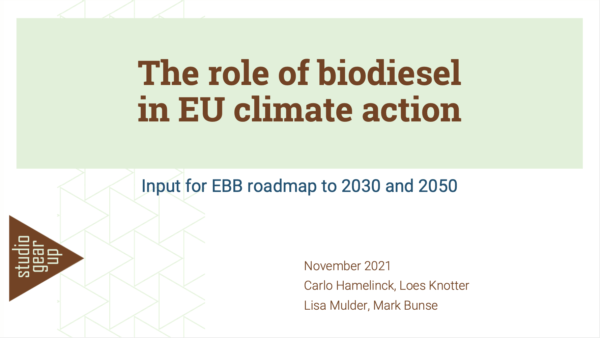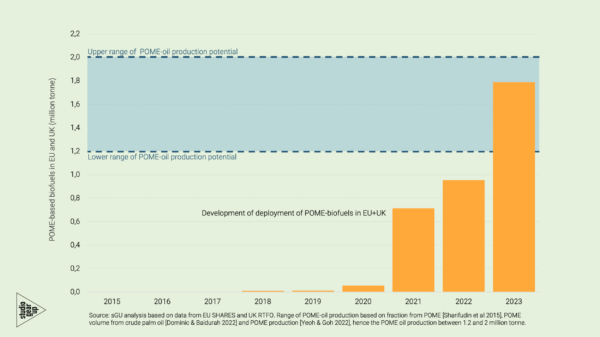For: EBB – European Biodiesel Board
[April – October 2021]
studio Gear Up was asked by the European Biodiesel Board (EBB) to provide good data about the biodiesel industry and its performance. EBB requires these insights for the development of a roadmap for its Members and also when discussing with policy makers and other external stakeholders. studio Gear Up also helped to explore how the market for biodiesel might further develop under different scenarios.
Our study concludes that renewable diesel replacements have an important role in EU climate action. And it further needs to increase towards 2030. Beyond 2030 a large additional volume of renewable fuels is needed in the diesel, fuel oil and kerosene segments, above what will be mandated by the proposed Fit-for-55 package published July 2021 by the European Commission. We found that diesel replacement producers should actively make themselves future-proof to play a role in addressing this gap. At the same time, current regulation hinders the contribution of biodiesel to climate action.
The EU Fit-for-55 policy package requires an unprecedented acceleration of climate action in the transport sector. Partially, this follows from mandates as specified by the proposals for RED III, FuelEU Maritime & ReFuelEU Aviation. Together these need a doubling of the deployment of renewable fuels in transport within a decade, from about 18 Mtoe today to 42 Mtoe in 2030. According to the Commission, these renewable fuels in 2030 will for a significant part consist of fuels that hardly exist today, such as e-fuels and advanced biofuels.

Figure 1. Diesel replacements need to substantially grow from 2020 to 2030. The left-hand pie chart shows the use of renewable fuels in the EU in 2020 (total = 15.7 Mtoe), the right-hand pie chart shows the amount of renewable fuels that would be needed in 2030 to get on the ETS track for zero climate emissions by 2050 (89.7 Mtoe), and how much is mandated by the combination of RED III, FuelEU Maritime and ReFuelEU Aviation (42.1 Mtoe). On top of the mandated amounts, an additional 30.9 Mtoe of renewable fuels would be needed in the diesel, fuel oil and kerosene segments. RED caps severely limit the role diesel replacements can play.
But an even stronger demand follows from applying ETS to transport subsectors: road transport and buildings together will need to linearly reduce emissions from 2025 onwards and achieve zero by 2043. While there may be leeway to achieve early emission reduction in the housing sector, the endpoint is fixed, and road transport will have to steep-up the use of renewable fuels. Even with the high electrification of passenger cars projected by the Commission, the legacy car park and heavy-duty vehicles will use fuels until at least 2050, and these fuels should be renewable. Marine and aviation become part of the broader ETS and will also have to contribute to emission reduction.
When combining the Commission’s projections on demand for transport, efficiency improvements and electrification, a combined demand for renewable fuels remains that can increase from about 90 Mtoe in 2030 to peak at about 160 Mtoe in 2043.
Most of this demand is in sectors that currently use diesel, fuel oil or kerosene. Today, their renewable substitutes are mainly produced from crop-based and waste vegetable oils. By 2030 the additional demand for renewable fuels in these segments could be about 31 Mtoe above what the Fit-for-55 package mandates.
To bring the emissions from transport in line with the ETS path to climate neutrality by 2045-2050 would require a combination of pathways and solutions:
- Expansion into Annex IX A type feedstocks and fuels
- Sustainable increasing of crop production and Annex IX B feedstock mobilisation, and allowing these to increase beyond the current caps
- Improving confidence in diesel replacements and its feedstocks as a sustainable solution
- Recognising co-benefits of biodiesel beyond transport
To download the report
The report can be downloaded here.




